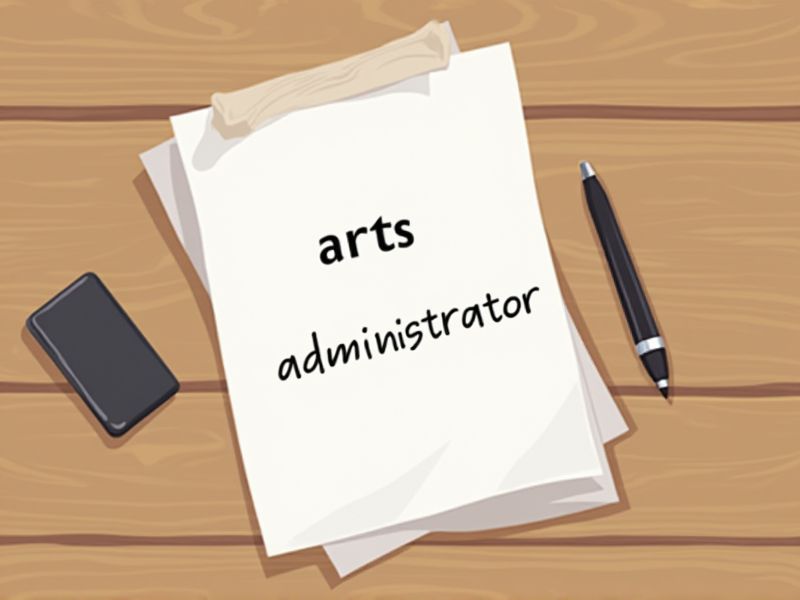
Arts administrators operate at the intersection of creativity and management, necessitating a blend of skills not typically acquired through mere experience. Certifications provide a structured way to acquire essential knowledge in areas such as project management, fundraising, and organizational leadership. With the complexities of budgeting, legal regulations, and community engagement, specialized training ensures administrators can effectively navigate diverse challenges. Here are some important certifications you may need as an arts administrator.
Certified Arts Administrator (CAA)
Certified Arts Administrator (CAA) credentials validate an arts administrator's professional expertise and knowledge. Holding a CAA enhances career prospects by offering a competitive edge in a field where documented skills are crucial. This certification fosters a standardized understanding of best practices, ensuring arts organizations operate efficiently. Employers gain confidence in hiring decisions, knowing that certified individuals meet established industry standards.
Certified Cultural Manager (CCM)
The presence of a Certified Cultural Manager (CCM) equips arts administrators with specialized skills to navigate the complexities of cultural projects, enhancing their operational efficiency. This certification ensures a deeper understanding of cultural policies, which directly impacts strategic decision-making. Arts administrators benefit from the expanded network and resources provided by CCM, fostering collaborations that drive successful cultural initiatives. By obtaining CCM, arts administrators are better positioned to secure funding, due to their demonstrated expertise and dedication to cultural management.
Arts Management Certificate (AMC)
The Arts Management Certificate (AMC) equips arts administrators with specialized skills in organizational leadership, enhancing their capability to manage creative endeavors effectively. Training through AMC provides essential knowledge in financial management specific to the arts, crucial for maintaining fiscal stability in nonprofit and cultural organizations. Exposure to marketing and audience development strategies through AMC allows arts administrators to expand and engage audiences, ensuring the sustainability of artistic projects. AMC's curriculum also offers a grounding in legal and regulatory issues, minimizing risks associated with intellectual property and contract disputes in the arts sector.
Nonprofit Management Certificate (NMC)
A Nonprofit Management Certificate equips arts administrators with essential skills in financial management and fundraising, allowing them to effectively sustain arts programs. Understanding nonprofit laws and governance aids in navigating legal complexities, ensuring compliance and ethical operations. It provides strategic planning skills critical for crafting long-term visions and responding to the dynamic arts landscape. Knowledge in marketing and community engagement enhances their ability to build support and promote their organization's mission.
Certified Fundraising Executive (CFRE)
Obtaining a CFRE designation enhances an arts administrator's credibility by validating their fundraising expertise and ethical practices. This credential demonstrates a commitment to professional development, which can improve donor trust and increase potential funding opportunities. Arts organizations often rely on securing consistent and substantial donations to maintain their operational and artistic endeavors; thus, a CFRE provides the necessary skills and strategies to effectively meet those financial goals. As funding landscapes become increasingly competitive, certified professionals are better equipped to navigate complex donor interactions and secure necessary resources.
Grant Writing Certification (GWC)
Grant Writing Certification improves the ability of arts administrators to secure funding by enhancing their proposal writing skills. The certification provides a standard measure of competence, leading to increased trust from potential funders. Receiving grant writing training broadens understanding of funding landscapes, which is crucial for navigating complex financial environments within the arts sector. Certified administrators often demonstrate higher success rates in obtaining grants, which boosts the financial sustainability of their organizations.
Project Management Professional (PMP)
Obtaining a Project Management Professional (PMP) certification equips arts administrators with structured methodologies to effectively manage large-scale projects often seen in the cultural sector. The certification provides essential skills in budgeting, scheduling, and risk assessment, crucial for coordinating complex arts events and exhibitions. PMP-certified administrators are likely to improve communication among diverse teams and stakeholders, fostering more collaborative environments. This ultimately enhances project efficiency and successful program delivery, contributing to better utilization of limited resources typically encountered in arts organizations.
Financial Management for Nonprofits Certification (FMNC)
Arts administrators often face unique financial challenges, and the Financial Management for Nonprofits Certification (FMNC) equips them with specialized skills to navigate these complexities effectively. Nonprofit arts organizations require accurate budgeting and funding strategies, and FMNC provides tools to enhance these critical processes. Donors and stakeholders gain increased confidence in organizations with certified administrators, potentially leading to more support and resources. Certification also helps administrators adapt to evolving financial regulations, ensuring legal compliance and ethical financial practices.
Digital Marketing Certification for Arts Organizations
Arts organizations face increasing competition in the digital landscape, prompting the need for administrators to harness effective digital marketing strategies. Certification equips administrators with the skills to reach broader audiences, enhancing visibility and engagement. With digital proficiency, arts organizations can optimize budget allocation towards more impactful online campaigns. Staying current with evolving digital trends ensures arts organizations remain relevant and competitive in attracting patrons and supporters.
Community Arts Engagement Certification (CAEC)
The need for Community Arts Engagement Certification (CAEC) for arts administrators arises from a growing demand for programs that effectively connect communities through art. Given the role that arts administrators play, the certification ensures they possess essential skills in fostering cultural inclusivity and audience engagement. The certification provides a structured understanding of how to create impactful community partnerships and sustainable projects. With CAEC, arts administrators can more competently navigate challenges in contemporary community arts initiatives, thereby elevating program success rates.
Summary
When you obtain certifications as an arts administrator, your career prospects broaden significantly. Your expertise becomes more recognized, leading to increased credibility in the arts field. This often results in more opportunities for higher leadership roles with better compensation. Organizations prefer certified professionals, enhancing your network and collaborative potential.
